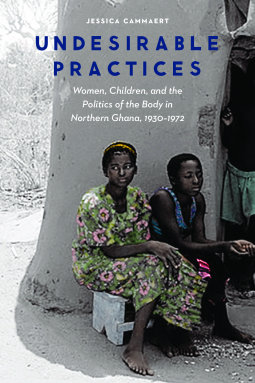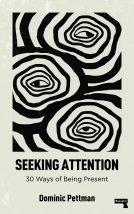
Undesirable Practices
Women, Children, and the Politics of the Body in Northern Ghana, 19301972
by Jessica Cammaert
This title was previously available on NetGalley and is now archived.
Send NetGalley books directly to your Kindle or Kindle app
1
To read on a Kindle or Kindle app, please add kindle@netgalley.com as an approved email address to receive files in your Amazon account. Click here for step-by-step instructions.
2
Also find your Kindle email address within your Amazon account, and enter it here.
Pub Date Jul 01 2016 | Archive Date Jul 31 2016
Description
With its examination of broader time periods and topics and its complex analytical arguments, Undesirable Practices makes a valuable contribution to literature in African studies, contemporary advocacy discourse, women and gender studies, and critical postcolonial studies.
Advance Praise
“As a cultural anthropologist, I find [Cammaert’s] work especially useful for providing a deeper (in time) understanding of how African culture and gender socialization has been reshaped over the decades.”—Angela R. Bratton, associate professor of anthropology at Georgia Regents University and the author of An Anthropological Study of Factors Affecting the Construction of Sexuality in Ghana
Available Editions
| EDITION | Hardcover |
| ISBN | 9780803286801 |
| PRICE | $55.00 (USD) |
Links
Average rating from 4 members
Featured Reviews
 Reviewer 76613
Reviewer 76613
"If you want to be counted, put some clothes on."
The politics of women's rights is a complex subject, and that's without adding relativism, imperialism, and cultural trusteeship to the mix. Undesirable Practices seeks to track the relationships and reactions to nudity, FGM (referred to in the book as "female circumcision"), and slavery-related practices such as human pawning. Some of the facts are as startling as they are appalling; for example, for years, colonists actively encouraged FGM of infants under the apparent belief that it was milder than when performed on adolescents.
Cammaert tackles a dense subject, and as an utter novice in the subject, I soon discovered that I was not in the book's target audience. Thesis-turned-nonfiction-type books vary widely in their levels of accessibility. Cammaert assumes a high level of expertise in her readers, or at least a higher level than I could muster. She casually refers to events such as the 1922 Women's War in southeastern Nigeria and the politics of the Gold Coast with the assumption that the reader will catch the references without further explanation. Personally, I spent a lot of time on Wikipedia. The book seeks to fill in the anthropological side of the issue and therefore doesn't discuss the statistics, apparently assuming the reader already is familiar with them. As a numbers person, I was left adrift in a sea of assertions with plenty of anecdotes but precious little proof. For example, Cammaert portrays "bundo," or "female circumcision," as an operation performed by men on women. This is the antithesis of everything I've ever heard about bundo, and given that her primary proof seemed to be a single event observation by a male anthropologist in the 1930s, I remained unconvinced.
Undesirable Practices would, I think, be a fascinating book for an expert in the subject, someone already aware of the history of the area, the underlying statistics, and the impact of trusteeship, FGM, and pawning on the affected cultures. The book is, in some ways, mainly about the anthropologists, not about the people they studied or even the repercussions of those studies on the people. In particular, it focuses heavily on anthropologist Robert Sutherland Rattray and in particular, the tensions between Rattray and the colonial authorities.
Starting with the colonists' attempts to recreate a mythical pre-colonial Africa, it tracks the ways that male colonial bias, fear of detribalization, and a preference for indirect rule--but not cultural relativism-- led to the trustees' support of initiation rights even as a changing economy exacerbated practices such as pawning. Reaction to this fostered the creation of rescue narratives which in turn led to a backlash against "primitive" practices such as nudity. Possibly due to my lack of knowledge, I found the narrative somewhat disconnected. In fact, until she restated it in the conclusion, I couldn't have told you precisely what Cammaert's thesis was. While I was thoroughly convinced by her argument that women were seen primarily in reproductive terms and that cultural upheaval was repeatedly framed in terms of "gender chaos," I was less persuaded by her argument that these issues were driven by male power over women, with men exercising their power by dismissing the problem and instead "looking away." While that element is certainly present, casting an embarrassed unwillingness to delve into "women's matters" as a cool exercise of male trusteeship. It seemed more like bewildered incompetence to me.
However, many other aspects of the narrative were fascinating, such as the colonial legal case surrounding the pawning/enslavement of three girls. It was fascinating to hear the narrative from the girls themselves, even if it was refracted through the eyes of the colonial authorities. I was also interested by the sharp distinction made between FGM and male circumcision. During most of the relevant time period, the (minimal and still-disputed) health benefits of male circumcision were unknown, meaning that the primary difference came from whether the mutilation was performed by the colonialists as well. The most interesting aspect of the narrative came after the nation gained independence and began to struggle with "undesirable practices" as a way of shedding perceived primitivism. Suddenly, nudity had become a woman's problem, and in turn was cast as a problem for the whole country. Overall, while it assumes a high degree of familiarity with the subject, if you already know the cultural and historical context, I think Undesirable Practices would make for an interesting read.
BookLikes: http://pagefault.booklikes.com/post/1379073/
Goodreads: https://www.goodreads.com/review/show/1585947898
 David W, Media/Journalist
David W, Media/Journalist
No good deed goes unpunished
Undesirable Practices begins powerfully, making a distinction between progress and development. They are not necessarily the same thing and can sometimes be opposites. So in this case, pushing ancient African societies to sedentary agriculture might have been beneficial from a food supply standpoint, but less than beneficial to their societies. While this seemed to be the foundation of a radical approach to the abuse of women and children, Cammaert leaves it lying there, and heads for the archives.
Socially undesirable practices turns out to be an official term, started with a study by the University of Ghana, and spread by Kwame Nkrumah’s government beginning in the 1950s. His embarrassment at public nudity and female circumcision meant lower status for Ghana on the world stage, which was unacceptable to him. There are four such practices: female circumcision, child slavery and pawning, nudity, and prostitution. The heaviest coverage in the book seems to be for female circumcision.
The good news is Cammaert relies entirely on archives accumulated by British colonialist administrators, which tend to be plentiful and consistent. The bad news is that Cammaert relies entirely on archives accumulated by British colonial administrators, with all their prejudices, lack of insight, and European superiority complexes.
Cammaert makes it tough on everyone. Despite the West’s detestation of female circumcision (or Kwame Nkrumah’s for that matter), motives from European colonialism to the male gaze (or aversion of gaze), as well as misguided intervention, misguided justice and misunderstood societies all weigh on efforts to stop it. It’s a lose-lose proposition for every one of her undesirable practices. No motive seems satisfactory.
Undesirable Practices does not break new ground. Rather, it is an examination of references for other researchers. This makes what could be a powerful indictment into a simple retelling of self-serving colonial rule and chaotic home rule. It’s still obviously important, but it minimizes its own potential impact.
David Wineberg
 Michelle K, Reviewer
Michelle K, Reviewer
Undesirable Practices
Women, Children, and the Politics of the Body in Northern Ghana, 19301972
by Jessica Cammaert
University of Nebraska Press
Politics, History
Pub Date 01 Jul 2016
I was given a copy of Undesirable Practices through the publisher and their partnership with Netgalley in exchange for my honest review which is as follows:
This book brings to light the undesirable practices placed upon women in Northern Ghana. In 1930 a questionnaire entitled "Customs affecting the Status of Women in West Africa and the questionnaire dealt with questions about female circumcision and how they affected the lives of the woman and also suggested ways that a difference could be made.
The chapter goes on to talk about issues of Women and Slavery in West Africa, and the hesitancy to expand female education.
This book talks about how Christian Sects played a role in influencing the practice of female Circumcision.
The Practices of Child Slavery, Pawning and Child Trafficking are also discussed.
This book talks about both the positive and negative roles some of these Policies placed upon those in West African Society have.
I found this book to be both educational and informative.
Five out of five Stars
Happy Reading
Readers who liked this book also liked:
Dominic Pettman
Health, Mind & Body, Nonfiction (Adult), Politics & Current Affairs

















